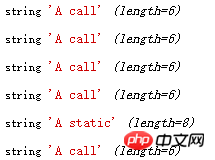Home >Backend Development >PHP Tutorial >How to use the __call() method in php and overloading example analysis
How to use the __call() method in php and overloading example analysis
- 伊谢尔伦Original
- 2017-07-03 11:47:501968browse
1. Preface
Pay special attention to the fact that although the call() or callStatic() method is designed to implement overloading, for ease of understanding, let’s understand them separately! ! !
The characteristics of the call() method are its characteristics. Using it to implement overloading is to implement overloading. These are two different things~
2. The call() method
After PHP5.3.0, a callStatic() method was added. They are all magic methods in PHP. The so-called magic methods are that the system automatically calls at a specific moment. Methods! In addition to these two, there are other magic methods in PHP (see the manual). Regarding magic methods, my personal understanding is that all magic methods have one thing in common: they are automatically called by the system, but there are two differences: the time of the call and the effect after the call Regarding the calling time and function of call() and callStatic() (the popular point is the result after the call), give a chestnut (the code is as follows)
<?php
class A {
public function test () {
static::who();
A::who();
self::who();
$this->who();
}
/**
*私有方法
*/
private function test2(){
}
public static function callStatic($a, $b) {
var_dump('A static');
}
public function call($a, $b) {
var_dump('A call');
}
}
$a = new A;
$a->test();
A::test1();
$a->test2();
?>The output is

·Call one of this class inside the class
Inaccessible (If it is in this class, it can only be inaccessible if it does not exist. If it is inaccessible outside this class, it may also mean that there is no access permission), regardless of Object method or static method can only trigger the call() method ·Calling a class in a class outside the class
is not accessible method, the object mode triggers the call() method, and the static mode triggers the callStatic() method
ps, inaccessibility does not only mean that it does not exist1. Give another example
class MethodTest {
public function call($name,$arguments)
{
// 注意: $name 的值区分大小写
echo "Calling object method '$name'的参数有多个,分别是:".implode ('、',$arguments)."<br/>" ;
}
/** PHP 5.3.0之后版本 */
public static function callStatic($name,$arguments)
{
// 注意: $name 的值区分大小写
echo "Calling static method'$name'的参数有多个,分别是:".implode ('、',$arguments)."<br/>" ;
}
}
$obj=new MethodTest ;
$obj->runTest ('in object context','另外一个参数');
MethodTest::runTest ('in static context','另外一个参数'); // PHP 5.3.0之后版本The output is

·When the call() or callStatic() method is triggered, the system will automatically pass the method name of the inaccessible method called as the first parameter into the call() or callStatic() method, and Pass the parameter passed in to the non-existing method being called as the second parameter (and it is encapsulated into an array, that is, each element is a parameter passed in when calling the inaccessible method) into call() or callStatic () method
·Then inside the call or callStatic() method, you can do some operations based on the two parameters passed in, which can be hooked up to overloading!
2. Um. . . Finally, give a chestnut
class Foo{
public function call($name,$arguments){
print("你是想调用$name"."()方法吗? 额...不好意思呦,该方法不可访问!<br/>");
}
}
$foo=new Foo;
$foo->doStuff();
$foo->doStuff1();The output is
 2. Overload
2. Overload
<?php
/**
*-------------------------------------------------------------
*正是鉴于call()或callStatic()方法的这种特性,即所传入的$name和$arguments,它们就用来实现重载!这点与JS每一个普通方法中都可以获取到一个arguments数组其实异曲同工
*举个例子
*/
class Foo1{
public function call($name,$arguments){
if($name=="doStuff"){
/**
*实际上,不仅仅可以第一个参数类型,还可以判断参数个数,以及参数顺序,那么就和C++等强数据类型语言的重载效果是一样的了!
*/
if(is_int($arguments[0])){
$this->doStuffForInt($arguments[0]);
}else if(is_string($arguments[0])){
$this->doStuffForString($arguments[0]);
}
}
}
private function doStuffForInt($a){
echo "执行的是doStuffForInt()方法";
}
private function doStuffForString($a){
echo "执行的是doStuffForString()方法";
}
}
$foo1=new Foo1;
$foo1->doStuff('1'); The above is the detailed content of How to use the __call() method in php and overloading example analysis. For more information, please follow other related articles on the PHP Chinese website!

